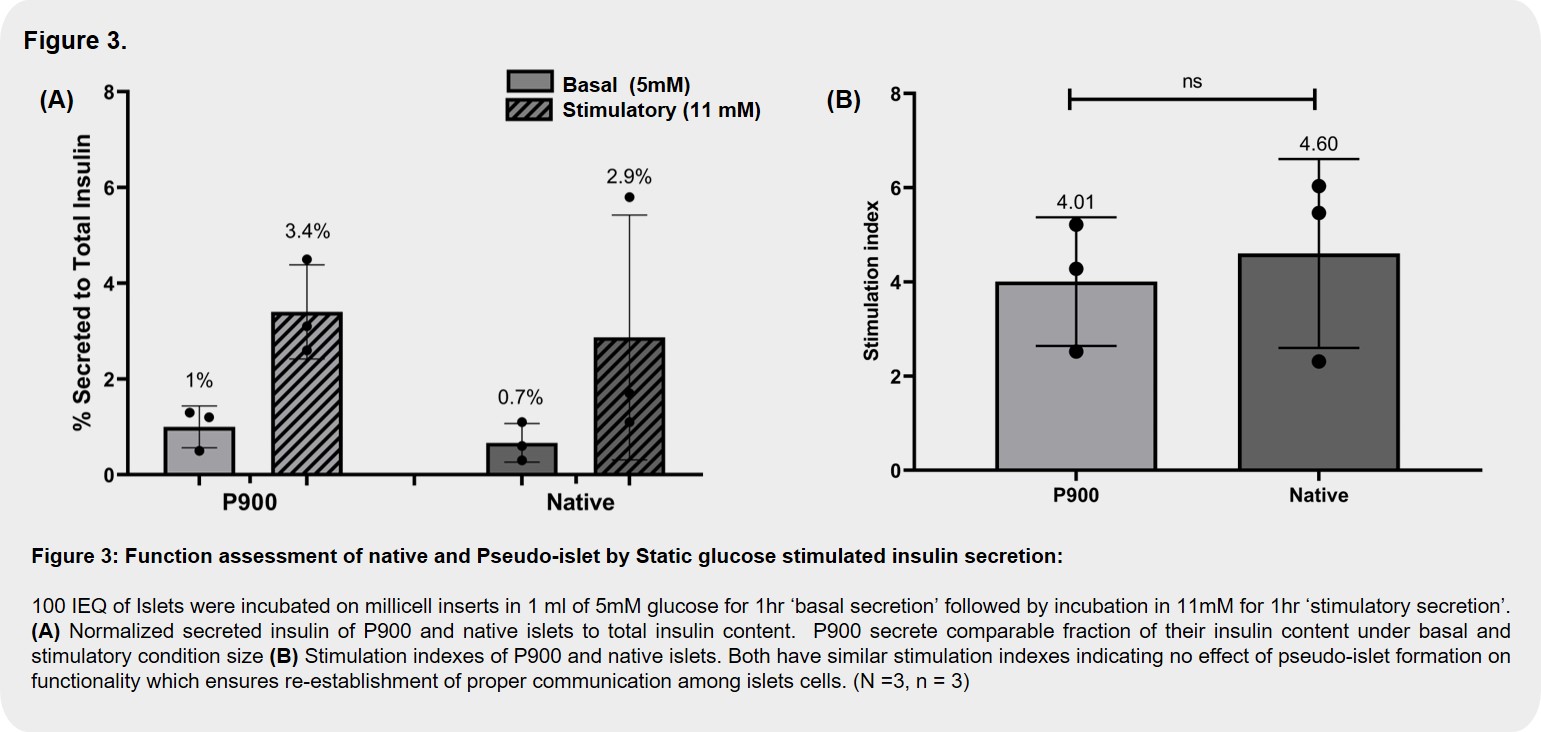Generation and Characterization of Porcine derived Pseudo-Islets for Islet-cell Replacement
Hany Abdelgawad1,2,6, Undine Schubert1,2, Prateek Chawla2,3, Martin Kraetzl5, Janine Schmid1,2, Susann Lehmann1,2, Christian Cohrs2,3,4, Nikolay Ninov2,3, Tiago Alves2, Stefan Bornstein1,2,6, Elisabeth Kemter5, Barbara Ludwig1,2,6.
1Pancreatic Islet Transplantation, Carl Gustav Carus University Hospital, Dresden, Germany; 2Gene Centre and Department of Veterinary Sciences, Institute of Molecular Animal Breeding and Biotechnology, Munich, Germany; 3Paul Langerhans Institute Dresden, Dresden, Germany; 4Center For Regenerative Therapies , TU Dresden, Dresden, Germany; 5TransCampus, King's College London, London, United Kingdom; 6Institute for Pancreatic Islet Research, Helmholtz Diabetes Center, Munich, Germany
Introduction: Pancreatic islet transplantation is a safe and minimally invasive treatment for insulin-dependent diabetes but its availability is limited due to immunosuppression requirements and donor shortage. Addressing these limitations, our group developed immune-shielding strategies for islet macro-encapsulation [1] and exploring pig islets (adult or neonatal) as alternative cell sources [2]. In our macro-encapsulation setting, it is essential to use intact uniform islets with high purity and ideal size to reduce oxygen demand, maximize applicable density, and obtain optimal diffusion characteristics. This can be achieved by the Pseudo-islets (PIs) system. However, unlike other species, porcine islets fail to form PIs due to differences in basement membrane compositions [3]. Here, we managed to overcome this issue and establish a reproducible protocol of PIs generation from neonatal pig islets and characterize their morphology and functionality.
Method:
- Pseudo-islets generation: Islets were dissociated into single cells by Accumax. Then seeded into a microwell plate at different seeding density to generate different sizes. After 7 days, the PIs were harvested for analysis.
- Static GSIS: islets were pre-incubated in 5mM glucose for 2 hrs, then in 5 mM glucose for 1hr (basal) then in 11mM glucose for 1 hr (Stimulatory). Total insulin content was extracted by RIPA buffer. Samples were analyzed using the Cisbio insulin kit and Synergy neo2 plate reader.
- Flow Cytometry: islets were dissociated into single cells by accumax, stained with zombie dye to exclude dead cells, then fixed and permeabilized by Cytoperm/cytofix then blocked then stained against insulin, glucagon and somatostatin for 1hr. Samples analyzed by LSR Fortessa.
- Immunostaining islets were fixed and permeabilized by Cytoperm/Cytofix overnight, blocked by blocking buffer then stained overnight against insulin, glucagon and somatostatin. Images were acquired by Zeiss LSM 960.
Results: Our protocol enables reproducible production of size homogenous Pseudo-islets (Fig.1). In comparison to native islets, the pseudo-islets formation does not alter the ratios of the major cellular subtypes (Fig. 2A) nor their architecture (Fig. 2B). Their functionality (assessed by static GSIS) were also comparable.(Fig. 3A and 3B).
Conclusions: We successfully established a reproducible PIs generation protocol from porcine source. The generated PIs have similar cellular subtypes and they are functionally comparable to the native islets.



References:
[1] Ludwig, B. et al. “ Transplantation of human islets without immunosuppression”.2013.
[2] Ludwig, B. et al. "Favorable outcome of experimental islet xenotransplantation without immunosuppression in a nonhuman primate model of diabetes" 2017.
[3] Wang et al, “Characterization of Integrin Expression in Islets Isolated from Hamster, Canine, Porcine, and Human Pancreas” 1999.